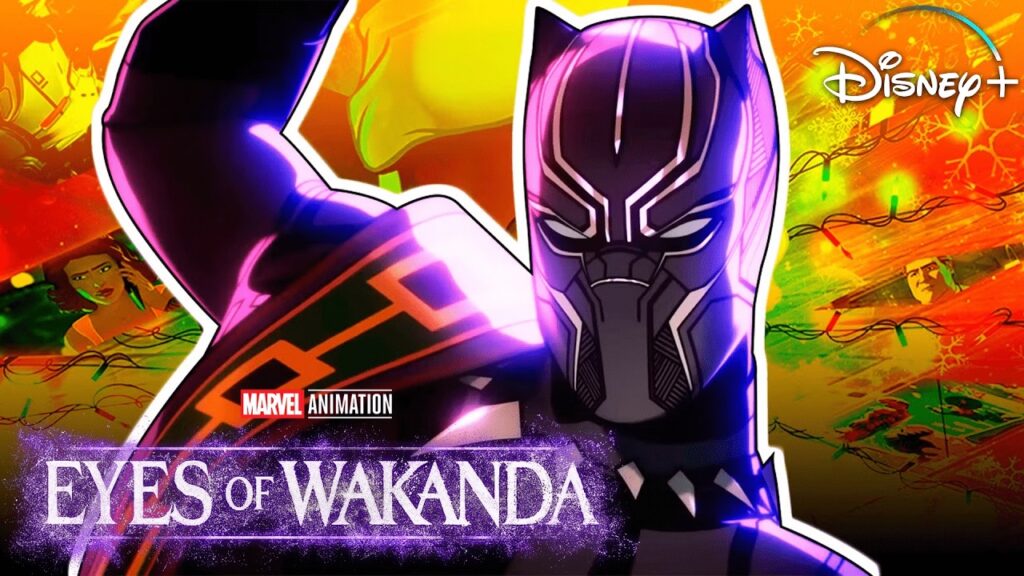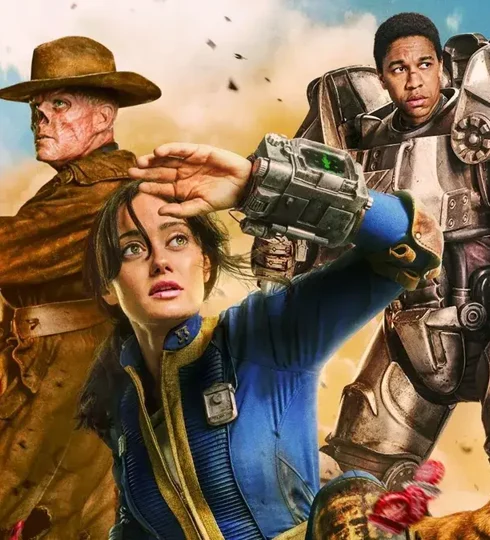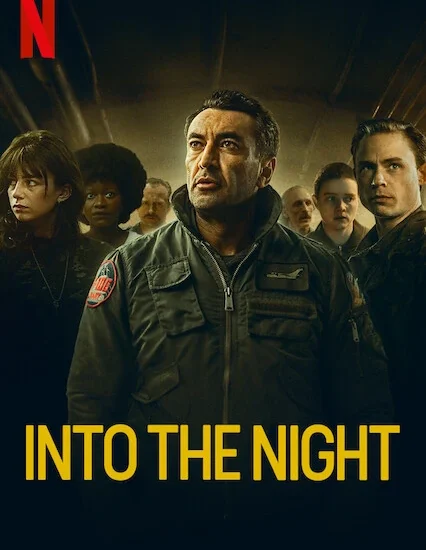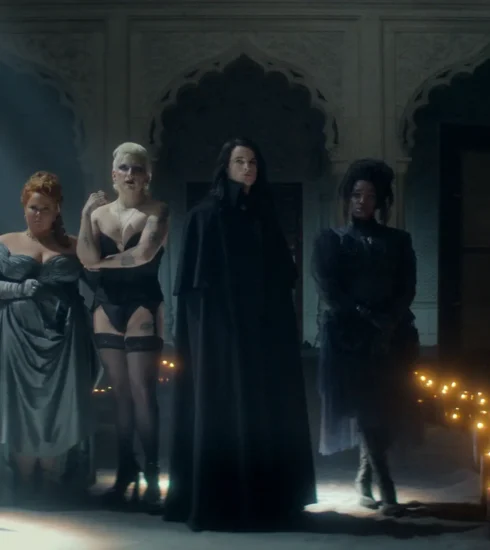Watch of the Week: Eyes of Wakanda
-
Boluwatife Adesina

- August 16, 2025
Wakanda, famously, is forever. So it makes sense that Wakandans’ adventures can go backwards in time as well as forward. In Eyes Of Wakanda — a four-part animated anthology series which expands the mythology first put properly on screen in Black Panther — the scope is not limited to the present day, or even Wakanda itself.
Developed and executive produced by Ryan Coogler, the series thrusts us into an Afrofuturist world of the past, from ancient Crete to 19th-century Ethiopia and beyond, where warriors from Black Panther’s homeland fight to reclaim what they hold most dear. The focus here is on new characters rather than recognisable heroes, and for the most part that pays off, thanks to some snappy writing and strong voice-acting; Jacques Colimon, in particular, has a lot of fun voicing the warrior Basha, a cocky spy who doesn’t take life too seriously; while Winnie Harlow also impresses as Noni, a former member of the Dora Milaje who could have easily led the whole series.
The animation here is strong. Eschewing the flat, occasionally stilted style of What If?, the animators instead draw inspiration from contemporary African-American artists to evoke a hand-painted (but computer-generated) style, evocative of traditional Disney animation. The result is gorgeous to look at and culturally resonant, forging a distinct identity that parallels the recognisable Wakandan elements we’ve seen in live-action. This fluidity also extends to the fights, which makes full use of the freedom animation allows for an exhilarating effect.
While the focus is largely Wakandan, that’s not to say everything here is entirely outside of the wider Marvel Cinematic Universe (MCU) mythos, especially with some fan-friendly second-half twists. For what could have been a by-the-numbers standalone project, some of the choices made here by showrunner Todd Harris are genuinely thrilling — choices that mean you’ll never look at Ryan Coogler’s Black Panther films in the same way again.
But beyond the breakneck action, the story itself almost moves too fast, covering huge swathes of time and space in only four half-hour episodes. Just when you emotionally connect to a character, Eyes Of Wakanda swiftly moves onto the next adventure. Extra episodes could have deepened those connections and made the most of this open-ended premise. Instead, what we’re left with is a promising start that will likely seem disposable to casual viewers. That’s unfortunate because at its best, Eyes Of Wakanda represents the true potential of Marvel’s small-screen efforts, expanding the MCU in ways that ensure Wakanda and this universe at large could go on indefinitely.
Boluwatife Adesina is a media writer and the helmer of the Downtown Review page. He’s probably in a cinema near you.
- Boluwatife Adesina
- Boluwatife Adesina
- Boluwatife Adesina
- Boluwatife Adesina
- Boluwatife Adesina
- Boluwatife Adesina
- Boluwatife Adesina
- Boluwatife Adesina
- Boluwatife Adesina
- Boluwatife Adesina
- Boluwatife Adesina
- Boluwatife Adesina
- Boluwatife Adesina
- Boluwatife Adesina
- Boluwatife Adesina
- Boluwatife Adesina
- Boluwatife Adesina
- Boluwatife Adesina
- Boluwatife Adesina
- Boluwatife Adesina
- Boluwatife Adesina
- Boluwatife Adesina
- Boluwatife Adesina
- Boluwatife Adesina
- Boluwatife Adesina
- Boluwatife Adesina
- Boluwatife Adesina
- Boluwatife Adesina
- Boluwatife Adesina
- Boluwatife Adesina
- Boluwatife Adesina
- Boluwatife Adesina
- Boluwatife Adesina
- Boluwatife Adesina
- Boluwatife Adesina
- Boluwatife Adesina
- Boluwatife Adesina
- Boluwatife Adesina
- Boluwatife Adesina
- Boluwatife Adesina
- Boluwatife Adesina
- Boluwatife Adesina
- Boluwatife Adesina
- Boluwatife Adesina
- Boluwatife Adesina
- Boluwatife Adesina
- Boluwatife Adesina
- Boluwatife Adesina
- Boluwatife Adesina
- Boluwatife Adesina
- Boluwatife Adesina
- Boluwatife Adesina
- Boluwatife Adesina
- Boluwatife Adesina
- Boluwatife Adesina
- Boluwatife Adesina
- Boluwatife Adesina
- Boluwatife Adesina
- Boluwatife Adesina
- Boluwatife Adesina
- Boluwatife Adesina
- Boluwatife Adesina
- Boluwatife Adesina
- Boluwatife Adesina
- Boluwatife Adesina
- Boluwatife Adesina
- Boluwatife Adesina
- Boluwatife Adesina
- Boluwatife Adesina
- Boluwatife Adesina
- Boluwatife Adesina
- Boluwatife Adesina
- Boluwatife Adesina
- Boluwatife Adesina
- Boluwatife Adesina
- Boluwatife Adesina
- Boluwatife Adesina
- Boluwatife Adesina
- Boluwatife Adesina
- Boluwatife Adesina
- Boluwatife Adesina
- Boluwatife Adesina
- Boluwatife Adesina
- Boluwatife Adesina
- Boluwatife Adesina
- Boluwatife Adesina
- Boluwatife Adesina
- Boluwatife Adesina
- Boluwatife Adesina
- Boluwatife Adesina
- Boluwatife Adesina
- Boluwatife Adesina
- Boluwatife Adesina
- Boluwatife Adesina
- Boluwatife Adesina
- Boluwatife Adesina
- Boluwatife Adesina
- Boluwatife Adesina
- Boluwatife Adesina
- Boluwatife Adesina
- Boluwatife Adesina
- Boluwatife Adesina
- Boluwatife Adesina
- Boluwatife Adesina
- Boluwatife Adesina
- Boluwatife Adesina
- Boluwatife Adesina
- Boluwatife Adesina
- Boluwatife Adesina
- Boluwatife Adesina
- Boluwatife Adesina
- Boluwatife Adesina
- Boluwatife Adesina
- Boluwatife Adesina
- Boluwatife Adesina
- Boluwatife Adesina
- Boluwatife Adesina
- Boluwatife Adesina
- Boluwatife Adesina
- Boluwatife Adesina
- Boluwatife Adesina
- Boluwatife Adesina
- Boluwatife Adesina
- Boluwatife Adesina
- Boluwatife Adesina
- Boluwatife Adesina
- Boluwatife Adesina
- Boluwatife Adesina
- Boluwatife Adesina
- Boluwatife Adesina
- Boluwatife Adesina
- Boluwatife Adesina
- Boluwatife Adesina
- Boluwatife Adesina
- Boluwatife Adesina
- Boluwatife Adesina
- Boluwatife Adesina
- Boluwatife Adesina
- Boluwatife Adesina
- Boluwatife Adesina
- Boluwatife Adesina
- Boluwatife Adesina
- Boluwatife Adesina
- Boluwatife Adesina
- Boluwatife Adesina
- Boluwatife Adesina
- Boluwatife Adesina
- Boluwatife Adesina
- Boluwatife Adesina
- Boluwatife Adesina
- Boluwatife Adesina
- Boluwatife Adesina
- Boluwatife Adesina
- Boluwatife Adesina
- Boluwatife Adesina
- Boluwatife Adesina
- Boluwatife Adesina
- Boluwatife Adesina
- Boluwatife Adesina
- Boluwatife Adesina
- Boluwatife Adesina
- Boluwatife Adesina
- Boluwatife Adesina
- Boluwatife Adesina
- Boluwatife Adesina
- Boluwatife Adesina
- Boluwatife Adesina
- Boluwatife Adesina
- Boluwatife Adesina
- Boluwatife Adesina
- Boluwatife Adesina
- Boluwatife Adesina
- Boluwatife Adesina
- Boluwatife Adesina
- Boluwatife Adesina
- Boluwatife Adesina
- Boluwatife Adesina
- Boluwatife Adesina
- Boluwatife Adesina
- Boluwatife Adesina
- Boluwatife Adesina
- Boluwatife Adesina
- Boluwatife Adesina
- Boluwatife Adesina
- Boluwatife Adesina
- Boluwatife Adesina
- Boluwatife Adesina
- Boluwatife Adesina
- Boluwatife Adesina
- Boluwatife Adesina
- Boluwatife Adesina
- Boluwatife Adesina
- Boluwatife Adesina
- Boluwatife Adesina
- Boluwatife Adesina
- Boluwatife Adesina
- Boluwatife Adesina
- Boluwatife Adesina
- Boluwatife Adesina
- Boluwatife Adesina
- Boluwatife Adesina
- Boluwatife Adesina
- Boluwatife Adesina
- Boluwatife Adesina
- Boluwatife Adesina
- Boluwatife Adesina
- Boluwatife Adesina
- Boluwatife Adesina
- Boluwatife Adesina
- Boluwatife Adesina
- Boluwatife Adesina
- Boluwatife Adesina
- Boluwatife Adesina
- Boluwatife Adesina
- Boluwatife Adesina
- Boluwatife Adesina
- Boluwatife Adesina
- Boluwatife Adesina
- Boluwatife Adesina
- Boluwatife Adesina
- Boluwatife Adesina
- Boluwatife Adesina
- Boluwatife Adesina
- Boluwatife Adesina
- Boluwatife Adesina
- Boluwatife Adesina
- Boluwatife Adesina
- Boluwatife Adesina
- Boluwatife Adesina
- Boluwatife Adesina
- Boluwatife Adesina
- Boluwatife Adesina
- Boluwatife Adesina
- Boluwatife Adesina
- Boluwatife Adesina
- Boluwatife Adesina
- Boluwatife Adesina
- Boluwatife Adesina
- Boluwatife Adesina
- Boluwatife Adesina
- Boluwatife Adesina
- Boluwatife Adesina
- Boluwatife Adesina
- Boluwatife Adesina
- Boluwatife Adesina
- Boluwatife Adesina
- Boluwatife Adesina
- Boluwatife Adesina
- Boluwatife Adesina
- Boluwatife Adesina
- Boluwatife Adesina
- Boluwatife Adesina
- Boluwatife Adesina
- Boluwatife Adesina
- Boluwatife Adesina
- Boluwatife Adesina
- Boluwatife Adesina
- Boluwatife Adesina
- Boluwatife Adesina
- Boluwatife Adesina
- Boluwatife Adesina
- Boluwatife Adesina
- Boluwatife Adesina
- Boluwatife Adesina
- Boluwatife Adesina
- Boluwatife Adesina
- Boluwatife Adesina
- Boluwatife Adesina
- Boluwatife Adesina
- Boluwatife Adesina
- Boluwatife Adesina
- Boluwatife Adesina
- Boluwatife Adesina
- Boluwatife Adesina
- Boluwatife Adesina
- Boluwatife Adesina
- Boluwatife Adesina
- Boluwatife Adesina
- Boluwatife Adesina
- Boluwatife Adesina
- Boluwatife Adesina
- Boluwatife Adesina
- Boluwatife Adesina
- Boluwatife Adesina
- Boluwatife Adesina
- Boluwatife Adesina
- Boluwatife Adesina
- Boluwatife Adesina
- Boluwatife Adesina
- Boluwatife Adesina
- Boluwatife Adesina
- Boluwatife Adesina
- Boluwatife Adesina
- Boluwatife Adesina
- Boluwatife Adesina
- Boluwatife Adesina
- Boluwatife Adesina
- Boluwatife Adesina
- Boluwatife Adesina
- Boluwatife Adesina
- Boluwatife Adesina
- Boluwatife Adesina
- Boluwatife Adesina
- Boluwatife Adesina
- Boluwatife Adesina
- Boluwatife Adesina
- Boluwatife Adesina
- Boluwatife Adesina
- Boluwatife Adesina
- Boluwatife Adesina
- Boluwatife Adesina
- Boluwatife Adesina
- Boluwatife Adesina
- Boluwatife Adesina
- Boluwatife Adesina
- Boluwatife Adesina
- Boluwatife Adesina
- Boluwatife Adesina
- Boluwatife Adesina
- Boluwatife Adesina
- Boluwatife Adesina
- Boluwatife Adesina
- Boluwatife Adesina
- Boluwatife Adesina
- Boluwatife Adesina
- Boluwatife Adesina
- Boluwatife Adesina
- Boluwatife Adesina
- Boluwatife Adesina
- Boluwatife Adesina
- Boluwatife Adesina
- Boluwatife Adesina
- Boluwatife Adesina
- Boluwatife Adesina
- Boluwatife Adesina
- Boluwatife Adesina
- Boluwatife Adesina
- Boluwatife Adesina
- Boluwatife Adesina
- Boluwatife Adesina
- Boluwatife Adesina
- Boluwatife Adesina
- Boluwatife Adesina
- Boluwatife Adesina
- Boluwatife Adesina
- Boluwatife Adesina
- Boluwatife Adesina
- Boluwatife Adesina
- Boluwatife Adesina
- Boluwatife Adesina
- Boluwatife Adesina
- Boluwatife Adesina
- Boluwatife Adesina
- Boluwatife Adesina
- Boluwatife Adesina
- Boluwatife Adesina
- Boluwatife Adesina
- Boluwatife Adesina
- Boluwatife Adesina
- Boluwatife Adesina
- Boluwatife Adesina
- Boluwatife Adesina
- Boluwatife Adesina
- Boluwatife Adesina
- Boluwatife Adesina
- Boluwatife Adesina
- Boluwatife Adesina
- Boluwatife Adesina
- Boluwatife Adesina
- Boluwatife Adesina
- Boluwatife Adesina
- Boluwatife Adesina
- Boluwatife Adesina
- Boluwatife Adesina
- Boluwatife Adesina
- Boluwatife Adesina
- Boluwatife Adesina
- Boluwatife Adesina
- Boluwatife Adesina
- Boluwatife Adesina
- Boluwatife Adesina
- Boluwatife Adesina
- Boluwatife Adesina
- Boluwatife Adesina
- Boluwatife Adesina
- Boluwatife Adesina
- Boluwatife Adesina
- Boluwatife Adesina
About Author / Boluwatife Adesina
Boluwatife Adesina is a media writer and the helmer of the Downtown Review page. He’s probably in a cinema near you.






